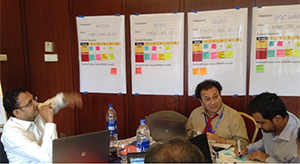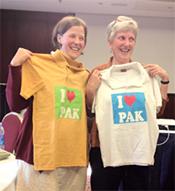Finding Hope in Pakistan’s Family Planning Picture
 A sobering yet upbeat publication about Pakistan’s public health challenges indicates, among other things, that reversing the neglect of family planning services could become a force for positive social change because three conditions align to make this possible: a high unmet need (25%); an inequity in services available to those who are poor but motivated, and evidence that conservatism and resistance, especially with respect to rural areas, poor populations and young women, can be overcome.
A sobering yet upbeat publication about Pakistan’s public health challenges indicates, among other things, that reversing the neglect of family planning services could become a force for positive social change because three conditions align to make this possible: a high unmet need (25%); an inequity in services available to those who are poor but motivated, and evidence that conservatism and resistance, especially with respect to rural areas, poor populations and young women, can be overcome.
The Marie Stopes Society (MSS) of Pakistan, a fierce defender of a women’s right to family planning services and information, is an important actor in this challenge. MSS describes itself as a social enterprise that provides reproductive health and family planning services to the people of Pakistan. Registered in 1990, MSS is a subsidiary of Marie Stopes International, headquartered in the UK.
Today MSS has contributed to access by poor women through 83 well equipped clinics throughout Pakistan. The Karachi centers have achieved ISO 9000:2001 standards and all provide high quality services through a ‘client-centered’ approach. MSS reaches populations in smaller urban centers through franchises and is available day and night to anyone who can dial in to their helpline, a service that is well used. Quality of its services is critical. For this reason it operates a strict and formal monitoring and evaluation system.
 As part of a project activity under the Health Communication Capacity Collaborative, implemented by Johns Hopkins Bloomberg School of Public Health Center for Communication Programs, MSH and JHU·CCP staff teamed up to spend a week with MSS mid- and senior-level staff to test two capacity strengthening tools, drawing from each organization’s strengths and experience in organizational development and social and behavior change communication respectively.
As part of a project activity under the Health Communication Capacity Collaborative, implemented by Johns Hopkins Bloomberg School of Public Health Center for Communication Programs, MSH and JHU·CCP staff teamed up to spend a week with MSS mid- and senior-level staff to test two capacity strengthening tools, drawing from each organization’s strengths and experience in organizational development and social and behavior change communication respectively.
The one-week workshop served many purposes: “the best possible orientation I could have wished for,” according to one new staff member in charge of organizational learning who spoke on behalf of many other newly hired colleagues in this fast growing organization; an educational experience about the science and disciplines of social and behavior change communication by those usually not involved in technical matters, such as finance and administration staff; a recognition that what is known and/taken for granted at the top levels, especially in regard to values and policies, may not percolate down to the periphery and a realization that there is always room to get better, both technically and organizationally.
Ordinary Pakistanis suffer from the world’s bad press. We were received warmly and treated to a different picture of Pakistan, not frightening, more encouraging, that make us believe that the hope expressed in the Lancet series is right on the mark.






Leave a Reply
Want to join the discussion?Feel free to contribute!